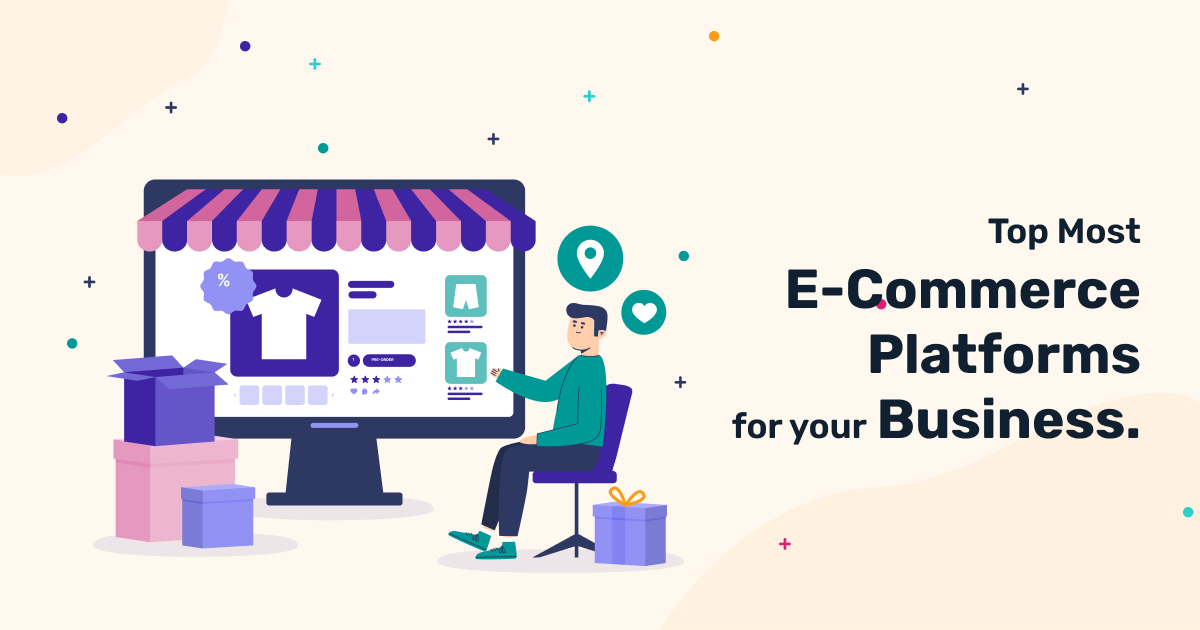- admin
- Blogs
- 10th January 2024
Topmost ECommerce Platforms for Your Business
An ecommerce platform includes software for developing and managing an ecommerce store, as well as handling other retail functions, including marketing, payment processing, and inventory management.
The top ecommerce systems enable retailers to create custom websites and oversee their companies as they expand and change.
Here, take a look at some of the finest ecommerce platforms for 2024 to help you make the proper decision for your clients.
Shopify
Shopify is the greatest ecommerce platform. Its privately hosted software allows you to sell wherever your clients are, with capabilities that cover every facet of retail, from website design to speedy shipment.
Shopify sellers may have a detailed picture of their activity from a single back office. You can concentrate on improving your online business, increasing its exposure by offering your services on social media, or experimenting with trendy sales methods such as dropshipping.
When your brand expands, Shopify can assist you in optimizing your overall sales possibilities. Shopify provides the highest conversion rate on the web, and Shopify POS enables easy-to-serve clients in person and connects orders directly to your dashboard.
If you’re testing with a new company concept, Shopify’s trial offer is an excellent place to begin. Choose from more than 100 themes to develop your store.
Shopify offers more helpful features, including-
- Inventory management and offering products direct to customers’ hands with Shopify Fulfilment.
- Create product descriptions and chat with customers with Shopify’s AI assistant.
- Manage international currencies, shipping, and taxes with tools associated with global sales.
- Capture hesitant buyers with abandoned cart recovery and email marketing campaigns.
- Fulfill your orders using the Shopify mobile app.
- Include thousands of third-party apps from the Shopify app store.
Moreover, Shopify offers immense support for developing ecommerce websites and also helps in growing your business online.
Wix-
Wix is a click-and-drop website developer that includes custom templates, web hosting, and domain name registration. You can create a basic website for free, but you’ll need to switch to a premium subscription to use the ecommerce capabilities.
Wix allows ecommerce retailers to receive online payments, track sales, and handle orders from different channels.
However, Wix lacks the tools that many product-based firms require. For example, there are no built-in low-stock notifications, and other essential inventory management capabilities are lacking. Third-party applications are required to gain access to those functionalities and the capacity to sell via social media. Find out how Wix compares to Shopify. Furthermore, the pros associated with Wix are that it is fully hosted and offers a free basic plan. On the contrary, its cons include a paid plan for tracking and analytics. Also, its sites are not transferable. Furthermore, the integrated sales channel, including Instagram and Facebook, needs third-party app Ecwid. Moreover, Wix requires a separate application for mobile POS.
BigCommerce
Enterprise-level businesses utilize BigCommerce as their ecommerce platform. It, like Shopify and Wix, provides online hosting and customization choices for your ecommerce business, as well as capabilities for international selling, SEO, and marketplace listings.
BigCommerce is designed for larger enterprises. However, some merchants believe it lacks simplicity and flexibility.
The requirement for a simple, flexible interface played a significant role in Grace & Lace’s decision to leave the platform. It migrated to Shopify Plus, Shopify’s corporate offering, to take advantage of the merchant-centric environment. Learn how BigCommerce compares to Shopify.
Pros: Fully hosted management tools for large organizations.
Cons: No native POS, Expensive themes. Some retailers think design tools lack usability.
Adobe Commerce (formerly Magento)-
Adobe Commerce is a non-hosted e-commerce platform designed for developers. It provides a great deal of flexibility for organizations looking for a custom website configuration, but customers will almost certainly require an in-house developer to manage their site and get the most out of the platform.
Adobe Commerce also lacks out-of-the-box capabilities for implementing a cohesive multichannel approach. There is no simple solution to enable social commerce or marketplace selling, and the same is true for handling foreign transactions.

